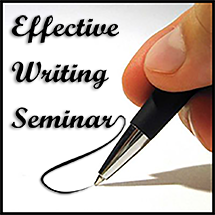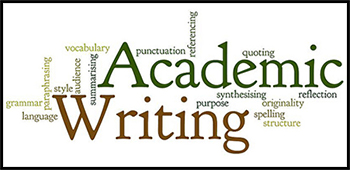
Effective Writing Website
Other Links
NOTE: Please click above to
access Compass or Blackboard.
Effective Writing Website
Lessons:
Organization
"Either write something worth reading or do something worth writing."
Benjamin Franklin
Inventor
Good writing begins with a well thought out plan or outline. Organization issues include a paper not in the typical 5-paragraph format; no introduction or conclusion paragraphs; and main body paragraphs not linked to a thesis or argument. Lack of organization is apparent when papers have no introduction or the introductions are too long. This lesson will provide you with an opportunity to review PowerPoint presentations and online resources, which explain techniques to bring organization to your writing.
Lesson Objectives:
- Identify the types of writing.
- Identify the benefits of outlining.
Exercise 1:
Review "Organization" techniques.
Exercise 2:
- How to Write a Good Argumentative Essay: Logical Structure
- Parts of a Paragraph - English Academic Writing Introduction
- Capital Community College Foundation. Principles of Organization. Hartford, CT: (accessed 7 April 2016).
- University of New England. Academic Writing. Portland, ME.
- United States Air Force. The Tongue and Quill, AFH 33-337. Washington, DC: USAF, 1 August 2004. CHP 6 Organizing Your Thoughts, pages 55-63 (8 pages).
- United States Air Force Academy. Executive Writing Course. Colorado Springs, CO: USAFA, no date, Organized Writing chapter, pages 2-6 (5 pages).
Review the following sites to gain additional writing techniques regarding Organization. In addition, DDE students please review the informaton in the Communicative Arts Directive.
Video Resources
Website Resources
References
"Ideas are the cheapest part of the writing. They are free. The hard part is what you do with the ideas [and facts] you've gathered."
Jane Yolen
Novelist
An incorrectly formatted paper sends the wrong message. Formatting issues include incorrect format on quotes and endnotes; no definition of acronyms; and over use of quotes. The DDE program utilizes the Turabian style for end-noting quotes, citations, and information utilized in papers. Understanding some basic rules for quotations and end noting will save you valuable time in drafting your paper. Correct application of these rules will reduce the chances of accidental plagiarism in your papers. If you are in doubt about using information from another source, you should annotate endnote information. The key is to apply your own analysis in addressing the essay question(s) while citing supporting materials properly.
Lesson Objectives:
- Identify proper citation methods.
Exercise 1:
- Georgetown University. Turabian Footnote/Endnote Style. Georgetown University Library On-Line, Washington, DC.
- United States Air Force. The Tongue and Quill, AFH 33-337. Washington, DC: USAF, 1 August 2004. Appendix 2 The Mechanics of Research, pages 337-355 (28 pages).
Review the following sites to gain additional writing techniques regarding formatting.
Video Resources
Website Resources
References
NOTE: Please click above to expand each lesson of instruction.

Content
"What is written without effort is in general read without pleasure."
Samuel Johnson
Writer
Most of us hurry through instructions before thoroughly understanding what is required. Answer/Analyze the Question includes issues such as not addressing the essay question; getting "off-track" in your essay response; and maintaining focus in your essay question answer. This lesson will help you to identify the question and to address the question in a logical manner. We expect you to address the question in your DDE written requirements in a direct manner and provide analysis with your response. This lesson will help you achieve the goal of maintaining focus in your writing.
Lesson Objectives:
- Identify and answer a question in an essay.
- Remain focused on the question in writing essays.
Exercise 1:
Review "Analyze the Question" techniques.
Exercise 2:
- Academic Essay Writing: Having Trouble Understanding Your Essay Question?
- The Importance of Understanding the Assignment
- University of New England. Question Analysis. University of New England On-line, Academic Writing. Portland, ME: February 24, 2011.
- Capital Community College Foundation. Being Logical. Hartford, CT.
- Texas A&M University. Essential Skills for Academic Writers. TAMUG Writing Lab, Texas A&M University at Galveston.
Review the following sites to gain additional writing techniques regarding answering the question.
Video Resources
Website Resources
References
"Always bear in mind that your own resolution to succeed is more important than any other."
Abraham Lincoln
President
In this lesson, you will learn how to determine if your essay has enough content to address a problem statement or essay question adequately. Content & Evidence issues include lack of substance; critical thinking; opinion; and analysis within an essay. Analysis of evaluated DDE essays indicates content is the number one writing issue experienced by students. Many of the written requirements you will face require you to discuss complex issues in relatively short essays. To be successful, you must write concisely and focus on the most important points, while disregarding extraneous information.
Lesson Objectives:
- Focus the content of your writing.
- Understand the differences between critical thinking, opinion, and analysis.
Exercise 1:
Review "Content & Evidence" techniques.
Exercise 2:
- University of New England. Academic Writing. Portland, ME.
- University of North Carolina. Evidence. Chapel Hill, NC.
Review the following sites to gain additional writing techniques regarding content and evidence.
Video Resources
Website Resources
Lesson 5: Reading, Understanding, and Resources
"The most valuable of talents is never using two words when one will do."
Thomas Jefferson
President
A famous saying among authors claims, "There is no such thing as good writing. There is only good rewriting." We agree. In other words, before you write your draft, ensure you understand the essay question, reading assignments, and keep track of the reading assignment citations you wish to source (quote) in your essay. Reading, Understanding, and Source issues include lack of referenced materials; minimal use of intended reading materials; and comprehension or understanding of the main topics within the required reading materials. This lesson will expose you to several comprehension methods and techniques that will prove useful to you over the next two years in DDE.
Lesson Objectives:
- Improve the ability to read critically.
- Identify main ideas in reading.
Exercise 1:
- (Lesson 06) Reading Critically and Taking Notes
- Essay Reading: Starting Out
- How To Improve Reading Speed And Comprehension
- How To Write an Essay : How To Organize Facts for an Essay
- Main Ideas in Reading
- University of North Carolina. Understanding Assignments. Chapel Hill, NC.
- University of North Carolina. Reading to Write. Chapel Hill, NC.
- United States Air Force. The Tongue and Quill, AFH 33-337. Washington, DC: USAF, 1 August 2004. Appendix 3 Effective Reading Strategies, pages 355-365 (10 pages).
Review the following sites to gain additional writing techniques regarding reading, understanding, and sourcing.
Video Resources
Website Resources
References
NOTE: Please click above to expand each lesson of instruction

Style
"What if I had said, instead of 'We shall fight them on the beaches,' 'Hostilities will be engaged with our adversary on the coastal perimeter?'"
Winston Churchill
Prime Minister
Good writing is not easy for most of us. It requires careful thought and attention to detail, and, perhaps most importantly, practice, practice, practice. Writing Style issues include editing and word choice; personal pronouns; clarity issues; and passive voice issues. In this lesson, you will learn about the importance of editing and rewriting your draft (or drafts). Never be satisfied with your first draft, and never submit your first draft as your final submission. This lesson will also help you in editing your first draft, use of word choice, personal pronouns, passive voice, and clarity issues. The readings will provide you with several techniques for getting your thoughts down on paper for the first time. It will also show you how to write with precision and with an economy of words. The readings will also show you how to pick the right words and how to avoid wordy sentences. The lesson includes short readings.
Lesson Objectives:
- Understand editing techniques.
- Select and use proper word choice.
Exercise 1:
- University of New England. Academic Writing. Portland, ME.
- Purdue Online Writing Lab (OWL). Mechanics. Lafayette, IN.
- Capital Community College Foundation. The Editing and Rewriting Process. Hartford, CT.
- Capital Community College Foundation. The Passive Voice. Hartford, CT.
- United States Air Force. The Tongue and Quill, AFH 33-337. Washington, DC: USAF, 1 August 2004. Chapter 7: Writing Your Draft, pages 65-90 (26 pages).
- United States Air Force. The Tongue and Quill, AFH 33-337. Washington, DC: USAF, 1 August 2004. Chapter 8: Editing Your Draft, pages 91-105 (14 pages).
- United States Air Force Academy. Executive Writing Course. Colorado Springs, CO: USAFA, no date. Active Writing Chapter, pages 18-22 (5 pages).
Review the following sites to gain additional writing techniques regarding writing style.
Website Resources
References
"You don't write because you want to say something, you write because you have something to say."
F. Scott Fitzgerald
Author
This last self-taught lesson will provide on-line resources to review basic grammatical rules. Grammar issues include verbs, nouns, pronouns, adverbs, adjectives, prepositions, conjunctions, and interjections. During your enrollment in the DDE program, you must write at a graduate level. A better understanding of basic grammar will help provide a framework, which you can continually improve upon. This lesson will expose you to several grammatical methods and techniques that will prove useful to you over the next two years in DDE. The lesson includes short readings.
Lesson Objectives:
- Identify proper grammatical rules.
Exercise 1:
- Texas A&M University. University Writing Center. Texas A&M, College Station, TX.
- Purdue Online Writing Lab (OWL). Grammar. Lafayette, IN.
- Capital Community College Foundation. Definitions of Basic Sentence Parts. Hartford, CT.
- United States Air Force. The Tongue and Quill, AFH 33-337. Washington, DC: USAF, 1 August 2004. Appendix 1 Mechanics of Writing, pages 263-337 (74 pages).
Review the following sites to gain additional writing techniques regarding grammar.
Video Resources
Website Resources
References
NOTE: Please click above to expand each lesson of instruction.



